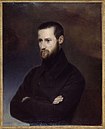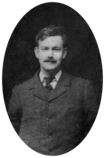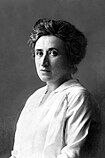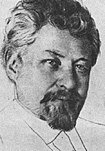Portal:Socialism/Selected biography
The layout design for these subpages is at Portal:Socialism/Selected biography/Layout.
| This Wikipedia page has been superseded by Portal:Socialism and is retained primarily for historical reference. |
| Note: Article entries are now being transcluded directly on the main portal page. However, this page should be retained for historical reference. |
Selected biography 1
Portal:Socialism/Selected biography/1
Claude Henri de Rouvroy, comte de Saint-Simon, often referred to as Henri de Saint-Simon (17 October 1760 – 19 May 1825) was a French early socialist theorist whose thought influenced the foundations of various 19th century philosophies; perhaps most notably Marxism, positivism and the discipline of sociology. He was born an aristocrat; the political ideologies he adopted in later life, however, do not fall into the aristocratic category.In opposition to the feudal and military system he advocated a form of state-technocratic socialism, an arrangement where industrialists would lead society and found a national community based upon cooperation and technological progress, which would be capable of eliminating poverty of the lower classes. In place of the church, he felt the direction of society should fall to the men of science. Men who are fitted to organize society for productive labour are entitled to rule it.
Selected biography 2
Portal:Socialism/Selected biography/2
James Keir Hardie, Sr. (15 August 1856 – 26 September 1915), was a Scottish socialist and labour leader, and was the first Independent Labour Member of Parliament elected to the Parliament of the United Kingdom. Hardie is regarded as one of the primary founders of the Independent Labour Party as well as the Labour Party of which it later was a part.Initially a Liberal, by the late 1880s Hardie had become convinced of the need for a distinct political organisation representing the interests of workers. By this time he was also active in publishing radical workers newspapers.
In 1892 Hardie was elected an independent Labour member of the House of Commons representing the West Ham South constituency in London. Hardie caused a stir when he first arrived at parliament as he was attired in workers clothes rather than the formal day suit and silk hat then thought necessary for the smooth conduct of parliamentary business.
In 1893 the Independent Labour Party was formed and Hardie became its first chairman. In 1895 he lost his West Ham South seat, but was re-elected to Parliament in 1900 to serve the Merthyr Tydfil seat, which he held until his death. Around this time the Labour Movement was ceasing to be so fractured and by 1906 the Labour Representation Committee had managed to get 29 Labour members elected to Parliament.
In 1906 the modern Labour Party was born and Hardie became its leader. That same year the Liberals won the general election with a huge landslide, beating the Conservative Party - but more significant was the election of 29 Labour MPs; the first of many to come.
Selected biography 3
Portal:Socialism/Selected biography/3
Karl Heinrich Marx (5 May 1818 – 14 March 1883) was a German philosopher, sociologist, economic historian, journalist, and revolutionary socialist who developed the socio-political theory of Marxism. His ideas have since played a significant role in the development of social science and the socialist political movement. He published various books during his lifetime, with the most notable being The Communist Manifesto (1848) and Capital (1867–1894), many of which were co-written with his friend, the fellow German revolutionary socialist Friedrich Engels.
Selected biography 4
Portal:Socialism/Selected biography/4
Eduard Bernstein (January 6, 1850 – December 18, 1932) was a German social democratic theoretician and politician, a member of the SPD, and the founder of evolutionary socialism and revisionism.Die Voraussetzungen des Sozialismus (1899) was Bernstein's most significant work and was principally concerned with refuting Marx's predictions about the imminent demise of capitalism. In it, Bernstein pointed out simple facts that he took to be evidence that Marx's predictions were not being borne out: he noted that the centralisation of capitalist industry, while significant, was not becoming wholescale and that the ownership of capital was becoming more, and not less, diffuse. He also pointed out what he considered to be some of the flaws in Marx's labor theory of value.
Bernstein believed that socialism would be achieved through capitalism, not through capitalism's destruction; as rights were gradually won by workers, their cause for grievance would be diminished, and consequently, so too would the foundation of revolution.
Selected biography 5
Portal:Socialism/Selected biography/5
Robert Owen (14 May 1771 – 17 November 1858) was a Welsh social reformer and one of the founders of utopian socialism and the cooperative movement.Owen's philosophy was based on three intellectual pillars:
- First, no one was responsible for his [or her] will and his [or her] own actions because his whole character is formed independently of himself; people are products of their heredity and environment, hence his support for education and labour reform, rendering him a pioneer in human capital investment.
- Second, all religions are based on the same ridiculous imagination, that make man a weak, imbecile animal; a furious bigot and fanatic; or a miserable hypocrite
- Third, support for the putting-out system instead of the factory system
Selected biography 6
Portal:Socialism/Selected biography/6
Hugo Rafael Chávez Frías (born 28 July 1954 – 5 March 2013) was the 56th President of Venezuela, serving for 14 years from 1999 until his death in 2013. Following his own political ideology of Bolivarianism and "Socialism for the 21st Century", he focused on implementing socialist reforms in the country as a part of a social project known as the Bolivarian Revolution, which saw the implementation of a new constitution, participatory democracy and the nationalisation of several key industries.Formerly the leader of the Fifth Republic Movement political party from its foundation in 1997, in 2007 he became the leader of the United Socialist Party of Venezuela (PSUV). He was elected President four times: in 1998, 2000, 2006 and finally—one year before his death—in 2012.
A firm anti-imperialist and vocal critic of neoliberalism and capitalism more generally, Chávez was a prominent opponent of United States foreign policy. Allying himself strongly with the socialist governments of Fidel and then Raúl Castro in Cuba, Evo Morales in Bolivia, Rafael Correa in Ecuador and Daniel Ortega in Nicaragua, his presidency was seen in the Western world as a part of the so-called socialist "pink tide" sweeping Latin America. Chávez supported Latin American and Caribbean cooperation and was instrumental in setting up the pan-regional Union of South American Nations, the Bolivarian Alliance for the Americas, the Bank of the South, and the regional television network TeleSur. A highly controversial and divisive figure both at home and abroad, his political influence in Latin America led Time magazine to include him among their list of the world's 100 most influential people in both 2005 and 2006.
He died in Caracas on 5 March 2013 at the age of 58.
Selected biography 7
Portal:Socialism/Selected biography/7
Benjamin Tillett (11 September 1860 – 27 January 1943) was a British socialist, trade union leader and politician. He was born in Bristol and began his working life as a sailor, before travelling to London and taking up work as a docker.He began his career as a trade union organiser in 1887 by forming the Tea Operatives and General Labourers Union at Tilbury docks. Tillett and his union, renamed the Dock, Wharf, Riverside and General Labourers' Union, rose to prominence during the London dock strike of 1889, although the strike itself began without union involvement. Tillett also played a prominent role as a strike leader in dock strikes in 1911 and 1912. He was instrumental in forming the National Transport Workers' Federation in 1910, along with Havelock Wilson of the Seamen's Union.
Tillett's union was the largest of the unions which came together in 1922 to form the Transport and General Workers' Union, however, it was his deputy, Ernest Bevin, rather than Tillett himself, who took the major role in bringing about the amalgamation. Bevin became the General Secretary of the new union, but Tillett held the post of International and Political Secretary until 1931 and retained his seat on the General Council of the Trades Union Congress until 1932.
Tillett was a member of the Fabian Society and a founding member of the Independent Labour Party, but subsequently joined the Social Democratic Federation instead. He also joined the Bristol Socialist Society in the 1880s, when he often travelled to that city.
Selected biography 8
Portal:Socialism/Selected biography/8
Daniel De Leon was an American socialist newspaper editor, politician, Marxist theoretician, and trade union organizer. He is regarded as the forefather of the idea of revolutionary industrial unionism and was the leading figure in the Socialist Labor Party of America from 1890 until the time of his death.
Selected biography 9
Portal:Socialism/Selected biography/9
François Marie Charles Fourier (/ˈfʊəriˌeɪ, -iər/; French: [fuʁje]; 7 April 1772 – 10 October 1837) was a French philosopher and an influential early socialist thinker later associated with "utopian socialism". Some of Fourier's social and moral views, held to be radical in his lifetime, have become mainstream thinking in modern society. Fourier is, for instance, credited with having originated the word feminism in 1837.Fourier's social views and proposals inspired a whole movement of intentional communities. Among them in the United States were the community of Utopia, Ohio; La Reunion near present-day Dallas, Texas; the North American Phalanx in Red Bank, New Jersey; Brook Farm in West Roxbury, Massachusetts (where Nathaniel Hawthorne was one of the founders); the Community Place and Sodus Bay Phalanx in New York State, and several others. Later Fourier inspired a diverse array of revolutionary thinkers and writers.
Selected biography 10
Portal:Socialism/Selected biography/10
Louis Auguste Blanqui (French pronunciation: [lwi oɡyst blɑ̃ki]; 8 February 1805, in Puget-Théniers, Alpes-Maritimes – 1 January 1881, in Paris) was a French socialist and political activist, notable for his revolutionary theory of Blanquism.
Selected biography 11
Portal:Socialism/Selected biography/11
William Morris (24 March 1834 – 3 October 1896) was an English textile designer, poet, novelist, translator, and socialist activist. Associated with the British Arts and Crafts Movement, he was a major contributor to the revival of traditional British textile arts and methods of production. His literary contributions helped to establish the modern fantasy genre, while he played a significant role in propagating the early socialist movement in Britain.Although retaining a main home in London, from 1871 Morris rented the rural retreat of Kelmscott Manor, Oxfordshire. Greatly influenced by visits to Iceland, with Eiríkr Magnússon he produced a series of English-language translations of Icelandic Sagas. He also achieved success with the publication of his epic poems and novels, namely The Earthly Paradise (1868–1870), A Dream of John Ball (1888), the utopian News from Nowhere (1890), and the fantasy romance The Well at the World's End (1896). In 1877 he founded the Society for the Protection of Ancient Buildings to campaign against the damage caused by architectural restoration. Embracing Marxism and influenced by anarchism, in the 1880s Morris became a committed revolutionary socialist activist; after an involvement in the Social Democratic Federation (SDF), he founded the Socialist League in 1884, but broke with that organization in 1890. In 1891 he founded the Kelmscott Press to publish limited-edition, illuminated-style print books, a cause to which he devoted his final years.
Selected biography 12
Portal:Socialism/Selected biography/12
Richard Henry "R. H." Tawney (/ˈtɔːni/; 30 November 1880 – 16 January 1962) was an English economic historian, social critic, ethical socialist, Christian socialist, and an important proponent of adult education.The Oxford Companion to British History (1997) explained that Tawney made a "significant impact" in all four of these "interrelated roles". A. L. Rowse goes further by insisting that "Tawney exercised the widest influence of any historian of his time, politically, socially and, above all, educationally".
Selected biography 13
Portal:Socialism/Selected biography/13
Karl Liebknecht (German: [ˈliːpknɛçt] 13 August 1871 – 15 January 1919) was a German socialist and a co-founder with Rosa Luxemburg of the Spartacist League and the Communist Party of Germany. He is best known for his opposition to World War I in the Reichstag and his role in the Spartacist uprising of 1919. The uprising was crushed by the social democrat government and the Freikorps (paramilitary units formed of World War I veterans). Liebknecht and Luxemburg were killed.After their deaths, Karl Liebknecht and Rosa Luxemburg became martyrs for Socialists. According to the Federal Office for the Protection of the Constitution, commemoration of Liebknecht and Luxemburg continues to play an important role among the German far left.
Selected biography 14
Portal:Socialism/Selected biography/14
Rosa Luxemburg (also Rozalia Luxenburg; Polish: Róża Luksemburg; 5 March 1871 – 15 January 1919) was a German-Polish-Jewish Marxist theorist, philosopher, economist, anti-war activist, and revolutionary socialist who became a naturalized German citizen. She was, successively, a member of the Social Democracy of the Kingdom of Poland and Lithuania (SDKPiL), the Social Democratic Party of Germany (SPD), the Independent Social Democratic Party (USPD), and the Communist Party of Germany (KPD).Due to her pointed criticism of both the Leninist and the more moderate social democratic schools of socialism, Luxemburg has had a somewhat ambivalent reception among scholars and theorists of the political left. Nonetheless, some have regarded Luxemburg and Liebknecht as martyrs of the socialist cause.
Selected biography 15
Portal:Socialism/Selected biography/15
Edward Carpenter (29 August 1844 – 28 June 1929) was an English socialist poet, philosopher, anthologist, and early activist for rights for homosexuals. A poet and writer, he was a close friend of Rabindranath Tagore, and a friend of Walt Whitman. As a philosopher he was particularly known for his publication of Civilisation, Its Cause and Cure in which he proposes that civilisation is a form of disease that human societies pass through. An early advocate of sexual freedoms, he had an influence on both D. H. Lawrence and Sri Aurobindo, and inspired E. M. Forster's novel Maurice.
Selected biography 16
Portal:Socialism/Selected biography/16
Víktor Mikháilovich Chernóv (Russian: Ви́ктор Миха́йлович Черно́в; December 7, 1873 – April 15, 1952) was a Russian revolutionary and one of the founders of the Russian Socialist-Revolutionary Party. He was the primary party theoretician or the 'brain' of the party, and was more analyst than political leader. Following the February Revolution of 1917, Chernov was Minister for Agriculture in the Russian Provisional Government. Later on, he was Chairman of the Russian Constituent Assembly.
Selected biography 17
Portal:Socialism/Selected biography/17
Juan Evo Morales Ayma (born October 26, 1959), popularly known as Evo (Spanish pronunciation: [ˈeβo]), is a Bolivian politician and cocalero activist who has been serving as President of Bolivia since 2006. Widely regarded as the country's first president to come from the indigenous population, his administration has focused on the implementation of leftist policies, poverty reduction, and combating the influence of the United States and multinational corporations in Bolivia. A socialist, he is the head of the Movement for Socialism (MAS) party.Born to an Aymara family of subsistence farmers in Isallawi, Orinoca Canton, Morales undertook a basic education before mandatory military service, in 1978 moving to Chapare Province. Growing coca and becoming a trade unionist, he rose to prominence in the campesino ("rural laborers") union. In that capacity he campaigned against U.S. and Bolivian attempts to eradicate coca as part of the War on Drugs, denouncing these as an imperialist violation of indigenous Andean culture. His involvement in anti-government direct action protests resulted in multiple arrests. Morales entered electoral politics in 1995, became the leader of the MAS and was elected to Congress. His campaign focused on issues affecting indigenous and poor communities, advocating land reform and the redistribution of gas wealth. He gained increased visibility through the Cochabamba protests and gas conflict. In 2002 he was expelled from Congress for encouraging protesters, although he came second in that year's presidential election.
Morales has been praised for significantly reducing poverty and illiteracy in Bolivia and has been internationally decorated with various awards. His supporters have lauded him as a champion of indigenous rights, anti-imperialism, and environmentalism. Alternately, a number of leftist, indigenous, and environmentalist critics have accused him of failing to live up to many of his espoused values, while right-wing opponents have accused him of being excessively radical and authoritarian and claimed that his defence of coca contributes to illegal cocaine production.

















